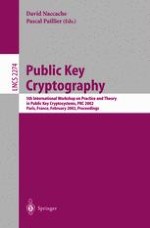2002 | OriginalPaper | Buchkapitel
RSA Key Generation with Verifiable Randomness
verfasst von : Ari Juels, Jorge Guajardo
Erschienen in: Public Key Cryptography
Verlag: Springer Berlin Heidelberg
Enthalten in: Professional Book Archive
Aktivieren Sie unsere intelligente Suche, um passende Fachinhalte oder Patente zu finden.
Wählen Sie Textabschnitte aus um mit Künstlicher Intelligenz passenden Patente zu finden. powered by
Markieren Sie Textabschnitte, um KI-gestützt weitere passende Inhalte zu finden. powered by
We consider the problem of proving that a user has selected and correctly employed a truly random seed in the generation of her RSA key pair. This task is related to the problem of key validation, the process whereby a user proves to another party that her key pair has been generated securely. The aim of key validation is to pursuade the verifying party that the user has not intentionally weakened or reused her key or unintentionally made use of bad software. Previous approaches to this problem have been ad hoc, aiming to prove that a private key is secure against specific types of attacks, e.g., that an RSA modulus is resistant to elliptic-curve-based factoring attacks. This approach results in a rather unsatisfying laundry list of security tests for keys.We propose a new approach that we refer to as key generation with verifiable randomness (KEGVER). Our aim is to show in zero knowledge that a private key has been generated at random according to a prescribed process, and is therefore likely to benefit from the full strength of the underlying cryptosystem. Our proposal may be viewed as a kind of distributed key generation protocol involving the user and verifying party. Because the resulting private key is held solely by the user, however, we are able to propose a protocol much more practical than conventional distributed key generation. We focus here on a KEGVER protocol for RSA key generation.
